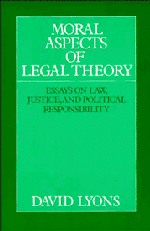Book contents
- Frontmatter
- Contents
- Preface
- Acknowledgments
- 1 The internal morality of law
- 2 On formal justice
- 3 Legal formalism and instrumentalism - a pathological study
- 4 Moral aspects of legal theory
- 5 Formal justice and judicial precedent
- 6 Derivability, defensibility, and the justification of judicial decisions
- 7 Constitutional interpretation and original meaning
- 8 A preface to constitutional theory
- 9 Basic rights and constitutional interpretation
- 10 Critical analysis and constructive interpretation
3 - Legal formalism and instrumentalism - a pathological study
Published online by Cambridge University Press: 10 December 2009
- Frontmatter
- Contents
- Preface
- Acknowledgments
- 1 The internal morality of law
- 2 On formal justice
- 3 Legal formalism and instrumentalism - a pathological study
- 4 Moral aspects of legal theory
- 5 Formal justice and judicial precedent
- 6 Derivability, defensibility, and the justification of judicial decisions
- 7 Constitutional interpretation and original meaning
- 8 A preface to constitutional theory
- 9 Basic rights and constitutional interpretation
- 10 Critical analysis and constructive interpretation
Summary
Holmes and those who followed in his wake believed they were rejecting a rigid and impoverished conception of the law (often called “formalism”) which had, in their view, adversely affected judicial practice. They spawned a collection of doctrines that Professor Summers dubs “pragmatic instrumentalism” – fittingly so-called both because they viewed the law as an eminently practical instrument and because they were so strongly influenced by the philosophical pragmatists William James and John Dewey.
This essay has two parts. The first and longer part identifies and examines the basic doctrines of formalism and instrumentalism. The arguments offered by instrumentalists against formalism suggest that both schools generally agree on two fundamental points. First, the law is rooted in authoritative sources, such as legislative and judicial decisions (a “sourcebased” view of law). Second, legal judgments that are justifiable on the basis of existing law can be displayed as the conclusions of valid deductive syllogisms the major premises of which are tied very tightly to the authoritative texts (a “formalistic model” for legal justifications). The difference between the schools concerns the question of whether law is complete and univocal. Formalists are understood to argue that existing law provides a sufficient basis for deciding all cases that arise. This belief, in combination with the formalistic model for legal justifications, leads the formalists to conclude that the authoritative texts are logically sufficient to decide all cases.
- Type
- Chapter
- Information
- Moral Aspects of Legal TheoryEssays on Law, Justice, and Political Responsibility, pp. 41 - 63Publisher: Cambridge University PressPrint publication year: 1993
- 1
- Cited by



